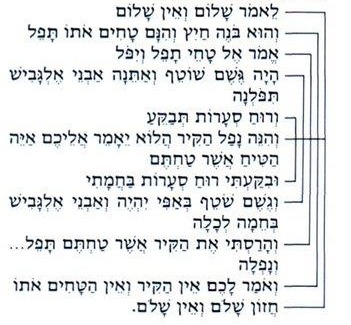Yechezkel 13 | The False Prophets and Prophetesses
As we have already seen with Yechezkel's contemporary, Yirmiyahu, the struggle against false prophets was both difficult and crucial during the period of destruction. While the true prophets warned of the approaching catastrophe, sounded alarms, and emphasized the need to change course, many false prophets proclaimed the exact opposite: "They have misled My people, saying: ‘All is well,’ when all is not well" (13:10). Yechezkel presents a parable of a crumbling house — rather than repairing it, someone comes along and daubs it with whitewash, concealing its flaws. A false prophet who calms the people when sirens should be wailing, is like someone who sees a red warning light flashing in their car and chooses to disconnect the bulb instead of going to the mechanic.
The parable of the house daubed with whitewash is presented in a chiastic structure (a diagram from Olam HaTanakh illustrating this is attached below). The first section: "saying, ‘All is well,’ when all is not well" (13:10), parallels the final section: "asserting visions to her that all is well when all is not well, declares the Lord God" (13:16). The second section: "The people build a thin wall, and they daub it with whitewash" (13:10), parallels the penultimate section: "I will say to you: Gone is the wall, gone are those who daubed it" (13:15). And so on the rest of the prophecy. The purpose of this chiastic structure is to emphasize the central element — the rhetorical question that underscores the false prophets' responsibility for the wall's imminent collapse: "and when the wall falls, will they not ask of you, ‘Where is the whitewash that you daubed?" (13:12).
The prophecy does not address the people, attempting to persuade them to heed the true prophets and abandon the false ones. Rather, it speaks directly to the false prophets themselves. As we learned in our study of Yirmiyahu (Chapters 28–29), it is exceedingly difficult for the average person to distinguish between a true prophet and a false one. Therefore, Yechezkel confronts the false prophets directly, threatening them with divine punishment: "My hand will be against the prophets who assert false visions, those who divine lies; they will not be part of the company of My people; they will not be written in the annals of the House of Israel; they will not come back to the soil of Israel; you will know that I am the Lord God... I will exhaust My wrath upon the wall, upon those who daubed her with whitewash; I will say to you: Gone is the wall, gone are those who daubed it" (13:9–15).
After addressing the false prophets, who spread lies in the realm of public policy, Yechezkel turns to the false prophetesses, who seem to have operated in the domain of personal life: "proclaiming death to those who should not die and life to those who should not live" (13:19). Their actions produce the same distortion: they reassure those who ought to be alarmed and repent, while frightening those who are on the right path: "for with lies you depress the hearts of the righteous whom I would not cause pain and strengthen the actions of the wicked so that he does not turn from his evil course and live" (13:22). The word of God applies in all realms — political and personal — and wherever the light of prophecy reaches, there are shadows that must be fought.



This website is constantly being improved. We would appreciate hearing from you. Questions and comments on the classes are welcome, as is help in tagging, categorizing, and creating brief summaries of the classes. Thank you for being part of the Torat Har Etzion community!